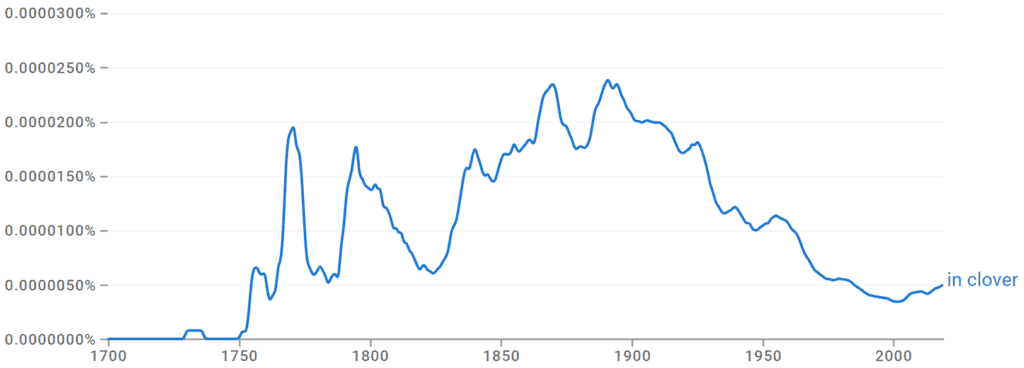To live or be in clover means that a person is in a good place or situation in life and that they have few worries for the future. For example, you might say someone who has just graduated from college with honors and various high-paying job offers is in clover, or set up for a successful future career.
It is an idiomatic phrase derived from the literal image of a happy cow placidly chewing her cud while in a field of clover. The imagery denotes the animal without worry, which is what it is used to relate to when applied elsewhere.
Idioms provide a figurative description of a state of being. When used in such a manner, they elevate the English language through the added connections they make with an author’s message.
Read on to learn about this expression’s meaning, origins, and use through examples within this article.
Understanding ‘In Clover’ Meaning

In clover means to be in luxury, a situation of great comfort, or to be in a place in life where one needn’t worry about the future. Someone who is in clover often has all their basic needs met and resources to enjoy extra entertainment or comforts. It can also be used to infer someone’s contentment with their position or excitement about a situation or occurrence.
For example:
- Her passion had always been art, so she was in clover after moving to Paris and securing a position at The Louvre as a restoration apprentice.
- They were in clover after he received the grant, allowing them to invest in the expansion of the technical and career center.
- Winning the lotto provided them the means to purchase their home outright and settle in clover for the remainder of their lives.
In Cover Origins

The idiom “in clover” goes back at least to the 1700s and is based on the fact that cattle enjoy eating clover over other vegetation. Clover is especially nutritious and fattening to a cow; thus, a happy cow is a cow in clover, literally.
Its figurative use, meaning to live luxuriously, is attributed to the early 1700s.
One of the first documented uses of the phrase is from “To the Divine Apollo,” published in The British Apollo:
I liv’d in Clover, to my thinking,
’Till I perceiv’d the Rino (money) sinking.
It became a popular phrase within the 18th century, often used in newspapers of the time:
This Liberty has produced great Abundance; Cows, Hogs and other Cattle, are brought daily into the Camp, with Fruits, Wine and other Things: The Soldiers live in Clover, the Officers grow rich and the Country People Wise, if Affliction can make them so. (The Caledonian Mercury May 1734).
It is well known all the world over,
The English clergy live in clover;
That they have all things at command,
Money good store, as well as land. (The Scots Magazine December 1745)
English lexicographer Samuel Johnson (1709–1784) recorded the definition of clover and its figurative use in 1819 within “A Dictionary of the English Language: In which the Words are deduced from their Originals, and Illustrated in their Different Significations by Examples from the best Writers”:
To live in Clover, is to live luxuriously; clover being extremely delicious and fattening cattle
The idiomatic use of the phrase has stayed consistent for hundreds of years, and although may not be as popular today as it once was, is still considered a valid way of saying one is content, happy, or living in luxury.
Let’s Review
In clover is a figurative play on words that has existed since at least the 1700s. Its literal association is one of a fat, happy, and content cow standing in a field of clover with a full belly. This description has been applied through the centuries to a variety of situations involving a person’s success and contentment in life.
Although the expression is not as well used today due to the weak relationship many people have with a rural setting, it is still a fun way to explain someone’s comfort.
Enjoyed reading about this idiom? Check out some others we covered:
